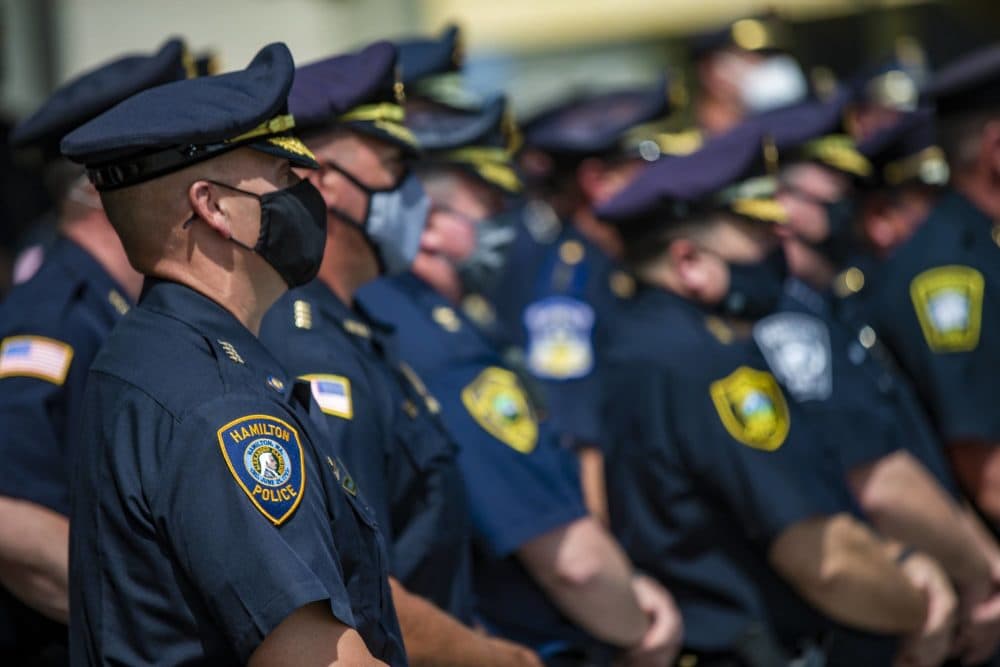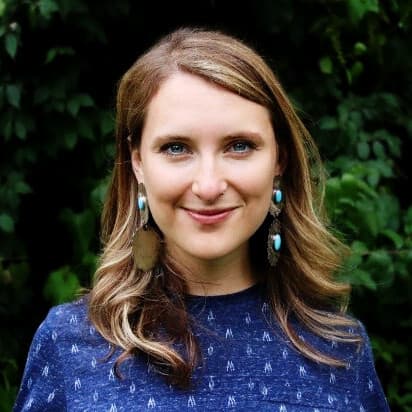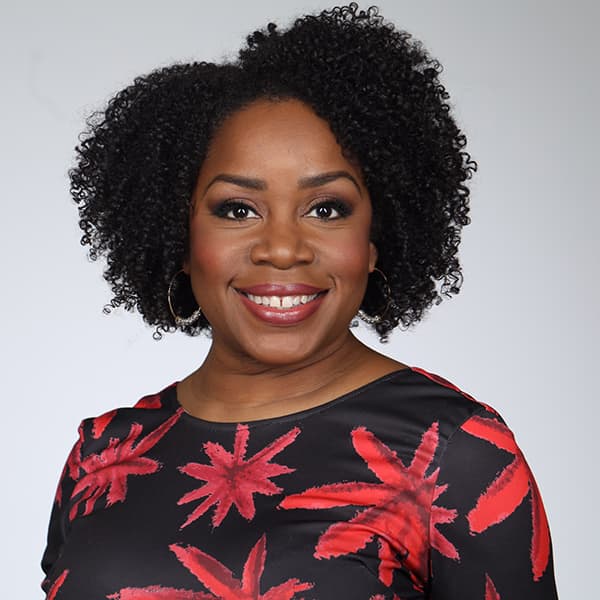Advertisement
Chauvin Guilty Verdict: What Police Reform In The U.S. Should Look Like
Resume
A jury finds former Minneapolis police officer Derek Chauvin guilty on all counts in the murder of George Floyd. We discuss America’s reckoning with racism and policing after the Chauvin verdict.
Guests
Nina Moini, reporter for Minnesota Public Radio. (@ninamoini)
Paige Fernandez, policing policy advisor at the ACLU. (@paigejfernandez)
Vaughn Dickerson, he grew up with George Floyd in Houston, Texas. Co-founder of 88 C.H.U.M.P., a nonprofit social activism organization.
Heather Taylor, senior advisor to the St. Louis Public Safety Director. Former night watch homicide sergeant with the St. Louis Metro Police Department. (@HthrTylr)
Interview Highlights
On the reaction in Minneapolis to the verdict yesterday
Nina Moini: “As you can imagine, people have really been on pins and needles here for the past few weeks. And during the trial of Derek Chauvin, there was also another police killing of a Black man. So there was just so much trauma, sadness and just anxiety in the community. And as hundreds of people were gathered outside of the Hennepin County courthouse awaiting this verdict, there was just anxiety. And then suddenly there was jubilation and joy and tears and just a very sudden shift. And then almost as soon as all of that happened, it appeared, at least to me, that the relief set in and then everybody sort of took a breath and said, OK, now there's more work to be done.
“So to witness that is just very humbling. To witness people who wanted so bad for justice to be served, but who then know that this is a beginning point and that as exhausted as everybody may be, there is still more work to be done and everybody's got to organize and sort of regroup and keep going. So that's a lot of the message that we heard. We heard from Benjamin Crump, the civil attorney for the Floyd family, that this was just this one … just through a lot of pain. So it wasn't exactly the happiest day, and it wasn't exactly justice for everybody. But I heard a lot of people say this was a really historic moment and a really good starting point.”
As a lifelong friend of George Floyd, what did this verdict mean to you?
Vaughn Dickerson: “It was bittersweet. You can't replace him. He's not here. He's not with the family. He's not going to see his daughter go to prom. He's not going to see them graduate, things of this nature. And then most importantly, he wasn't able to fulfill what he wanted to fulfill, his God given dreams. … Yesterday, again, I was in a somber mood. I wasn't saying anything, but it was just accountability. It was just a beautiful thing to find the jurors to convict Derek Chauvin. But it was more beautiful watching the news coverage of CNN and other news outlets and just seeing that it wasn't just people of color. It was Caucasians, it was Asians, it was a melting pot. And when you see Caucasian people throw up the Black power sign, a Black fist, saying that they are … with us, that they are our brothers, they are our sisters, that they are our keepers.
“And it was a younger generation. It was a beautiful thing. And to see the crowd not going crazy and jumping on top of police cars and things of that nature, which is what most people thought was going to happen, because this is what has happened in the past. But, you know, history repeats itself if you don't learn from it. So I think that as America, as a whole, as a country, they're learning from the mistakes of the criminal justice system. And that Black people are being racially profiled. We are being singled out and you see it every day. It’s happening every day. But the reason why things like this is happening is because there's no accountability. Yesterday showed me one thing, that there is accountability and it is starting. So we can breathe now. But for me, I never stopped breathing. Once my friend was murdered, I was breathing hard.”
What changes were catalyzed based on that from your viewpoint?
Paige Fernandez: “There were a few changes that we saw. I think there was a heavy emphasis across the country, especially from elected officials, on the idea of accountability and what happens after the fact, after harm is committed. So we saw a lot of bills being passed to hold officers accountable after they harmed community members, after they engage in misconduct. But on the local level, on the municipal level, we saw this reexamining of public safety. Really, what does it mean to be safe? And how do we invest in life affirming solutions and programs that are community-based and community-led that do not rely on law enforcement and our punitive criminal legal system? And so we've seen changes of removing police from traffic enforcement, removing police from responding to mental health crises and divesting from police departments by the millions of dollars.”
Is there any hope that the verdict may, at least for now, propel people forward to seek out solutions to this kind of violence?
Paige Fernandez: “I really do hope that it does propel people, and I'm really glad that Heather brought up the importance of local politics and doing work in your community, because that is where so much of the power we hold is, and that's where we can really implement effective and important changes. I think this is an opportunity to propel people. I encourage people to think bigger than our criminal legal system, though. This verdict is a punitive consequence for one individual. There is relief and punishment, but there is not justice. And in order to seek justice, we have to go further.
“And I do want to say, I mean, there are Black-led grassroots organizations, Black organizers and advocates across the country who are not backing down from this fight. Black Visions Collective and Reclaim the Block in Minneapolis and a bunch of other grassroots organizations in Minneapolis are working to put a measure on the ballot in November that would create an entirely new Department of Community Safety and Violence Prevention that is focused on a holistic public health approach to safety. And so there is so much going on. And really, I encourage people to get connected to the ground, get connected to local politics, join grassroots organizations and use this momentum to propel older and bigger changes in the future.”
From The Reading List
New York Times: "Derek Chauvin Verdict Brings a Rare Rebuke of Police Conduct" — "A former police officer who pressed his knee into George Floyd’s neck until well past Mr. Floyd’s final breath was found guilty of murder on Tuesday in a case that shook the nation’s conscience and drew millions into the streets for the largest racial justice protests in generations."
The Guardian: "Opinion: Today’s verdict isn’t ‘justice’. But accountability is a first step to justice" — "Everyone involved [in this prosecution] pursued one goal, justice. We pursued justice wherever it led."
Star Tribune: "After Daunte Wright's killing, criticism of 'pretextual' traffic stops grows" — "Diamond Sheriff helped attach some of the hundreds of air fresheners to a new fence surrounding the Brooklyn Center Police Department on Thursday, April 15."
The Atlantic: "The State Where Protests Have Already Forced Major Police Reform" — "In Loveland, Colorado—the nation’s self-proclaimed “Sweetheart City,” about an hour’s drive north of Denver—a young police officer paused earlier this month as he was arresting a pregnant woman who had outstanding warrants. Should he handcuff her, the officer asked his supervisors, or, under a new Colorado policing law, would that now be considered excessive force?"
USA Today: "What would happen if cops didn't make certain traffic stops? This North Carolina city offers a case study" — "Before dawn one morning, a woman in her late 60s was pulled over by a police officer. The officer said she’d run a stop sign."
Reuters: "United States Citizens lead the call for police reform since George Floyd’s death" — "Last summer, millions of ordinary Americans took to the streets to protest racism, police violence and the killing of George Floyd."
This program aired on April 21, 2021.

